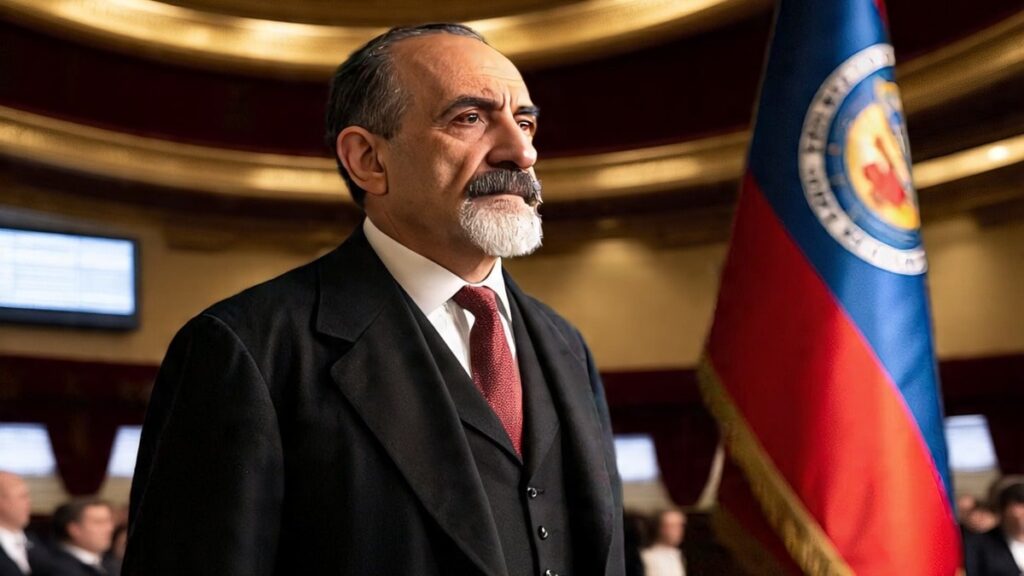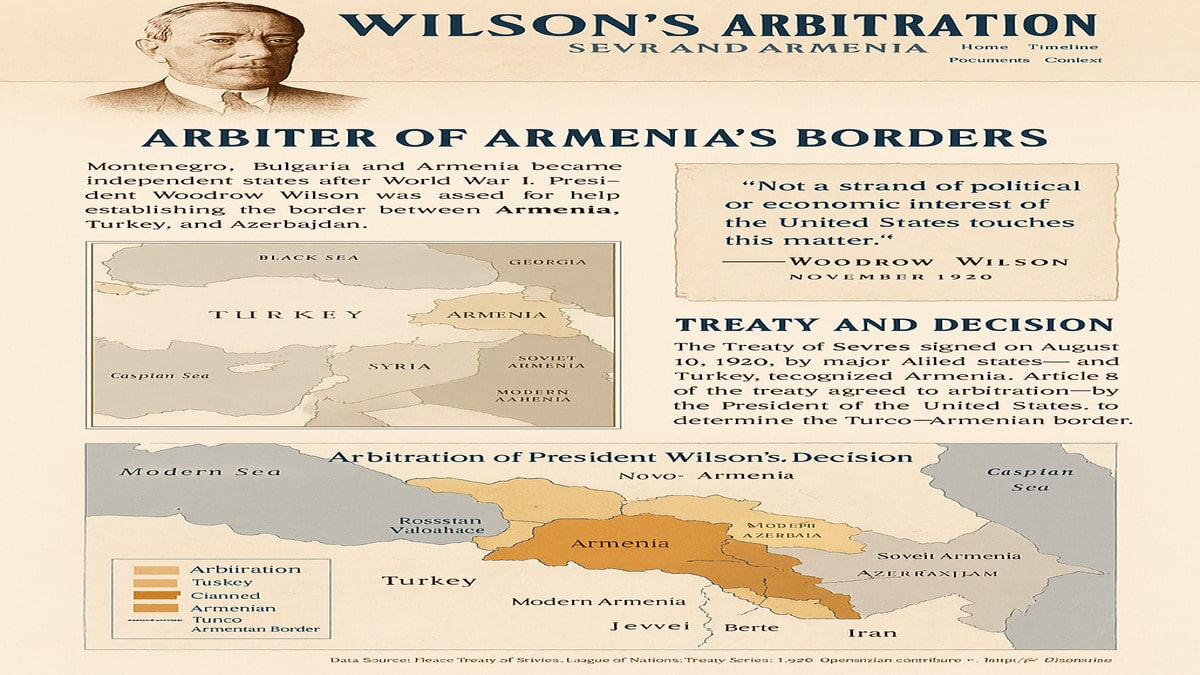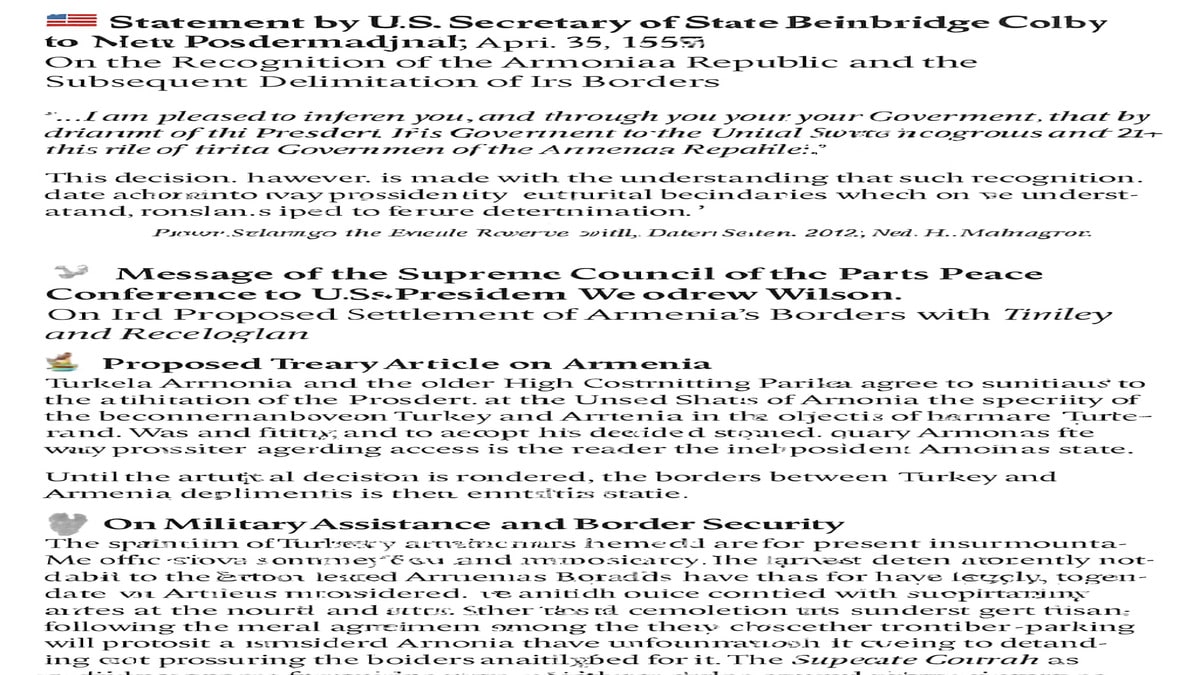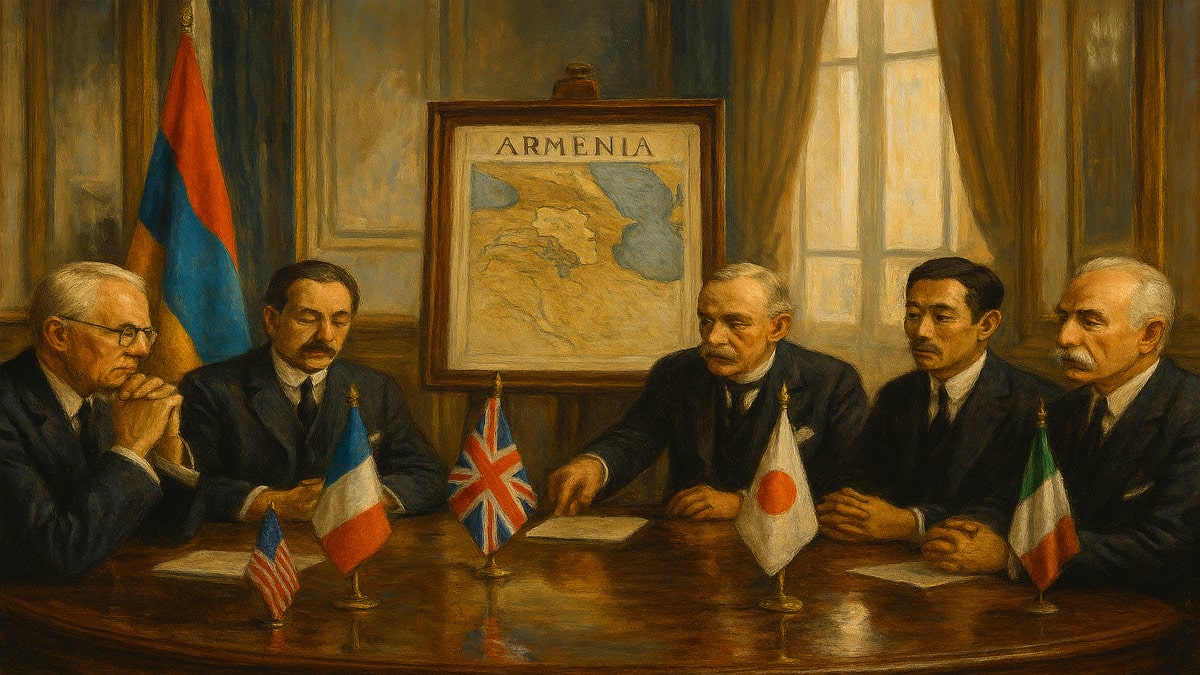
LETTER FROM THE HEAD OF THE DELEGATION OF THE REPUBLIC OF ARMENIA TO THE PEACE CONFERENCE, A. AGARONYAN, TO THE CHAIRMAN OF THE COUNCIL OF THE LEAGUE OF NATIONS, P. HYMANS, REGARDING THE AGGRESSION OF BOLSHEVIK RUSSIA, SOVIET AZERBAIJAN, AND KEMALIST TURKEY
October 6, 1920
Your Excellency,
I have received a telegram from my government, dated October 2, informing me that Turkish armed forces, consisting of regular troops under the command of Kâzım Karabekir, have launched a new advance towards Kars, initially delivering an ultimatum demanding that Armenia evacuate the districts of Oltu, Kars, and Ardahan “in implementation of the terms of the Brest-Litovsk Treaty.” These forces, which outnumber the Armenian army on this front, aim to impose the Brest-Litovsk Treaty, which cedes the provinces of Kars and Batum to Turkey, and also seek to join Turkish forces with the Bolsheviks, in gross violation of the Treaty of Sèvres.
The telegram highlights the gravity of the situation due to the complete lack of fuel; Baku is in the hands of the Bolsheviks, who refuse to supply Armenia with fuel. Faced with extremely serious circumstances that ultimately threaten the interests of the Allied Powers themselves, the government of the Armenian Republic urgently appeals to the League of Nations, requesting intervention in any form it deems desirable to ensure respect for the Treaty of Sèvres.
The Armenian government is aware of the enormous difficulties faced by even the strongest and most prosperous powers and the reasons that compel them to focus their efforts on rebuilding their countries. The Armenian government also understands that each country must ensure its own defense and security. However, it wishes to point out that the war, which ended so victoriously for the main Allied Powers and for the just cause they defended, is still ongoing for Armenia under the worst conditions of isolation and deprivation.
Therefore, Armenia, in its dual capacity as an ally and a country whose interests are linked to those of the Entente, is compelled to request intervention, the only means of ensuring its security and restoring peace in the East. Armenia could easily ensure the defense of its borders against the Turkish invasion if it were not simultaneously threatened by the Tatars of Azerbaijan and the Bolsheviks. In this case, it would have to defend its positions on three fronts simultaneously, without being able to increase its armed forces due to insufficient supplies of arms, ammunition, equipment, etc., and also due to food shortages.
The advance undertaken by Kâzım Karabekir, representative of Mustafa Kemal in the Caucasus, is a new attempt by the Turks to unite the two large groups of Islam by crushing the state that serves as an obstacle to this unification, namely Armenia. For their part, the Bolsheviks favor this offensive, as they are convinced that the Muslim world revolution will inevitably lead to upheavals in the economy of the East, on which they are counting to spread their system.
The Armenian government believes it is justified in emphasizing the danger that this poses to universal peace if the Young Turks are given a free hand with the Bolsheviks. For this reason alone, the need to assist the Armenians becomes even more urgent. Since the Armenian government believes that under the current circumstances, the best way to thwart the Turko-Bolshevik plan would be for the Allies to occupy Trebizond, it has just addressed this proposal to the Allies.
In bringing the above to the attention of the League of Nations, the Armenian government formally protests against the violation of the Treaty of Sèvres caused by the actions of the Turkish troops under the command of Kâzım Karabekir and requests the League of Nations to take all necessary measures to prevent these actions.
I have the honor to remain, etc.
A. Agaronian
Chairman of the Delegation of the Republic of Armenia to the Peace Conference
Appendix 108 to the Protocol of the Eleventh Meeting, October 27, 1920
Procès-Verbal of the Tenth Session of the Council of the League of Nations held in Brussels, October 20th – October 28th, 1920. League of Nations [20/29/16]. P. 67, 69.
THE QUESTION OF AGGRESSION BY THE UNRECOGNIZED STATES OF TURKEY AND RSFSR AGAINST THE REPUBLIC OF ARMENIA AT THE TENTH SESSION OF THE COUNCIL OF THE LEAGUE OF NATIONS
First (private) meeting, Brussels, October 20, 1920, 4:30 PM.
… Mr. Balfour, rapporteur, stated that the British government is prepared to help Armenia with supplies of ammunition and military equipment to fight its enemies, but the government is not prepared to guarantee a loan to Armenia; other governments are likely also not ready to take on such responsibility.
…
The Council cannot take practical steps in this matter. The League of Nations is designed to deal with international relations between recognized and sovereign states. The current invasion of Armenia is being carried out by irregular troops that do not obey recognized and responsible governments. Moreover, the League does not have any armed forces.
…
The League can still try to find a mandatory for Armenia, and the Council will again make such a proposal at the upcoming Assembly meeting. However, all that the Council can do now is to pass on Armenia’s request to the Supreme Council, accompanied by an urgent recommendation to take action to assist Armenia.
REPORT OF THE SECRETARY-GENERAL OF THE LEAGUE OF NATIONS ON THE THREAT OF TURKO-AZERBAIJANI AGGRESSION AGAINST ARMENIA AND THE NEED TO DETERMINE ITS BORDERS
[ Fifth Plenary Meeting of the First Assembly of the League of Nations ]
Geneva, November 17, 1920, 10:30 AM.
…
The Armenian government has repeatedly appealed directly to the Council for help. On May 13, the Chairman of the Armenian Delegation in Paris informed the Chairman of the Council of the danger looming over Armenia from Azerbaijan’s actions and the threatening concentration of Turkish nationalist troops. The Council decided to pass on this appeal to the Supreme Council of the Allied Powers.
…
On October 6 and 12, the Chairman of the Armenian Delegation in Paris again appealed to the Council for help to resist the advance of Turkish nationalist troops. The Council did not consider that it could do more than pass on Armenia’s appeals to the powers that signed the Treaty of Sèvres.
…
The Council therefore sent these appeals to the heads of state of the four powers represented in the Supreme Council, insisting on the determination of Armenia’s borders and reminding them of their previous offer to consult and cooperate with the Supreme Council in any actions that might ensure the future security of the Armenian Republic.
DECISION OF THE FIFTH COMMITTEE OF THE ASSEMBLY OF THE LEAGUE OF NATIONS TO REJECT AZERBAIJAN’S REQUEST FOR ADMISSION TO THE LEAGUE OF NATIONS DUE TO ITS TERRITORIAL DISPUTES
November 20, 1920
…
The Committee, having considered the Report of the Sub-Committee on the request of the Azerbaijani Republic for admission, returns the question to the Assembly, opposing its admission.
…
The Azerbaijani government’s request for admission is not in order, as its borders are not definitively established, and it is not recognized de jure by any member of the League of Nations.
…
Lord Robert Cecil (South Africa) supported Mr. Benes’s proposal, considering that Azerbaijan is not a state that is free and able to give the necessary guarantees.
The proposal of Mr. Benes was unanimously adopted by the Committee in the following form: “The Committee, having considered the Report of the Sub-Committee on the request of the Azerbaijani Republic for admission to the League of Nations, returns the question to the Assembly, opposing its admission.”
League of Nations. The Records of the First Assembly. Meetings of the Committees
II. Geneva 1920; p. 173-174. 620
Yuri Barsegov “Nagorno-Karabakh in International Law and Global Politics”
Artatsolum
Read Also:
- Ancient and Medieval Sources on Artsakh (Karabakh) as Part of Armenia’s State Territory
- Message from Gandzasar Catholicos Esayi to Peter I August 10, 1716
- Memorandum Issued to Ivan Karapet Along with the Imperial Letter to the Armenian People Regarding Russia’s Readiness to Take the Armenians of Karabakh Under Its Protection June 3, 1723
- Decree of Peter I to the Armenian People Regarding Russia’s Willingness to Offer Protection to the Armenians of Karabakh
- On Armenian Hopes for Russian Assistance
- Report of Minas Vardapet to Peter I
- Contents of the Secret Letters from the Armenian Assembly and the Armenian Army of Karabakh to the Russian Emperor and Chancellor August 1724
- Contents of the Secret Letters from the Armenian Assembly and the Armenian Army of Karabakh to the Russian Emperor and Chancellor August 1724
- State Charter of Peter I On the Acceptance of the Armenian People Under the Protection of the Russian State and Their Resettlement from Karabakh to Newly Acquired Persian Provinces November 10, 1724
- Letters from the Catholicos and the Meliks of Karabakh
- Charter of Catherine I Addressed to the Armenian Assembly
- Message General Mkhitar—to the Russian Government
- The Armenian Assembly’s Request for Military Assistance June 19, 1727
- Result from Russia’s failure to fulfill its promises of assistance to the Armenians March 1736
- On the Issuance of the Decree Appointing Panah Khan
- Letter from General Potemkin to Prince Argutinsky with questions about the liberation of Armenia
- Appeal of Gandzasar Catholicos Hovhannes to Catherine II
- Letter from Melik Apov Iosifov to Provide Assistance to Russian Military Forces for the Liberation of Enslaved Karabakh
- Report of Prince G. Potemkin to Catherine II
- Request of General P. Potemkin to Prince G. Potemkin
- Letter from Archbishop Joseph Argutinsky to General P. Potemkin
- Memorandum to Catherine II on the Project for the Restoration of the Armenian Kingdom
- Decree of Paul I to General Count I. Gudovich
- Letter from Archbishop Joseph Argutinsky
- Report by State Councillor P. Kovalesky
- The Khan’s Vizier, Mirza Jamal Javanshir Karabakhsky
- From the Report of General Marquis Palluci to Alexander I
- The Gulistan Treaty – An Interstate Act of Iran’s Cession of the Karabakh Territory to Russia
- Report of General A. Yermolov to Alexander I Requesting the Waiver of Tax Arrears for the Karabakh Khanate
- LETTER FROM GENERAL A. YERMOLOV TO MEHTI-KULI KHAN
- Directive from General A. Yermolov to General I. Velyaminov
- Letter of Metropolitan Sarkis Hasan-Jalalyan To General A. Yermolov
- Letter from General I. Paskevich
- TREATY CONCLUDED BETWEEN RUSSIA AND PERSIA AT TURKMENCHAY
- Russian Military Historian V. Potto on the Essence of the Treaty of Turkmenchay
- Order of General I. Paskevich to Colonel L. Lazarev
- STATEMENT ON THE DIFFERING ATTITUDES OF ARMENIANS AND TATARS TOWARD THE ANNEXATION OF KARABAKH TO RUSSIA
- REPORT By the Acting Uezd Chief of the Dzhevanshir Uezd, D. Baranovsky
- From the Memoirs of a Member of the Russian National Council in Baku (1918–1919)
- “TREATY OF PEACE AND FRIENDSHIP” Between the Ottoman Empire and the Republic of Armenia
- Letter from A. Mikaelyan, Representative of the Karabakh and Zangezur Fellowship
- Note of Protest from the Ministry of Foreign Affairs of the Republic of Armenia
- Appeal of the Karabakh Armenian National Council To the Commander of Allied Forces in Baku
- LETTER FROM THE CHAIRMAN OF THE KARABAKH ARMENIAN NATIONAL COUNCIL
- Turks in Shushi
- Letter of Welcome from the Karabakh Armenian
- LETTER FROM GENERAL BAGRATUNI
- FROM THE MESSAGE OF THE ARMENIAN TELEGRAPH AGENCY
- REPORT FROM THE DIPLOMATIC REPRESENTATIVE OF ARMENIA IN GEORGIA
- Resolution of the Fifth Congress of Armenians of Karabakh
- Report by Prime Minister Hatisov to the Council of Ministers of Armenia
- FROM THE MEMORANDUM OF THE KARABAKH ARMENIAN NATIONAL COUNCIL
- 🇬🇧 ANNOUNCEMENT OF THE BRITISH MILITARY MISSION IN SHUSHA
- From the Memorandum of the Armenian Representative to the British Military Mission in Shusha
- Report from the Office of the Governor-General of Karabakh
- NOTICE FROM THE REPRESENTATIVE OF THE BRITISH MILITARY MISSION IN SHUSHI
- 🇬🇧 Doubts Expressed by British Delegate Eric Forbes Adam
- LETTER FROM THE ARMENIAN DIPLOMATIC REPRESENTATIVE
- Assessment by the Karabakh Armenian National Council
- “The Caucasian Word” on the Confirmation by a British Command Representative
- Letter from the Acting Governor-General of Karabakh
- OVERVIEW OF THE SITUATION IN THE CAUCASUS
- Proclamation of the Zangezur Armenian National Council
- Telegram from the Prime Minister of Armenia to the British High Commissioner
- MESSAGE TO THE DIPLOMATIC REPRESENTATIVE
- Photographic Evidence of the Annihilation of Shushi’s Thirty-Thousand Strong Armenian Population
- Appeal of the Karabakh Soldiers and Officers of the Armenian Army
- Territorial Dispute Between the Azerbaijan SSR (as part of the RSFSR) and the Republic of Armenia
- Telegram from the Minister of Foreign Affairs of Armenia
- Telegram from G. Ordzhonikidze to V. Lenin, I. Stalin, and G. Chicherin
- LETTER FROM MEMBERS OF THE CAUCASIAN BUREAU OF THE CENTRAL COMMITTEE OF THE RCP(B): A. AVANESOV, R. KATANYAN, AND AYKUNI
- Report of the Karabakh Community Delegation of Tiflis
- From the Report of People’s Commissar for Foreign Affairs of the RSFSR
- Letter from the People’s Commissar for Foreign Affairs of the RSFSR, G. Chicherin, to V. Lenin
- EXCERPT FROM THE MINUTES OF THE MEETING OF THE POLITBURO
- LETTER FROM MEMBERS OF THE CAUCASUS BUREAU OF THE CENTRAL COMMITTEE OF THE RCP(B)
- LETTER FROM MEMBERS OF THE CAUCASUS BUREAU OF THE CENTRAL COMMITTEE OF THE RCP(B) 11TH RED ARMY
- Telegram from the People’s Commissar for Foreign Affairs of the RSFSR, G. Chicherin
- Appeal from the Commander of the Armenian Expeditionary Detachment
- TELEGRAM OF THE PLENIPOTENTIARY REPRESENTATIVE OF THE RSFSRIN ARMENIA B. LEGRAND
- Letter from Armenian Foreign Minister A. Ohandjanian to the Head of the French Military Mission
- Telegram from Member of the Caucasian Bureau of the Central Committee
- Telegram from Member of the Caucasian Bureau of the Central Committee of the RCP(b)
- First Addendum to the Draft Peace Treaty between the RSFSR and the Republic of Armenia
- Telegram via Direct Line from RVS Member of the Caucasian Front V. Trifonov
- THE ATTITUDE OF THE ALLIED HIGH COMMISSIONER IN ARMENIA, COLONEL GASKELL, TOWARDS THE ARBITRARILY ESTABLISHED BORDERS OF THE TRANSCAUCASIAN STATES
- The Question of Armenia’s Borders at the First (Preliminary) Conference of the Allied Powers in London
- 🇺🇸 U.S. SENATE RESOLUTION NO. 359


